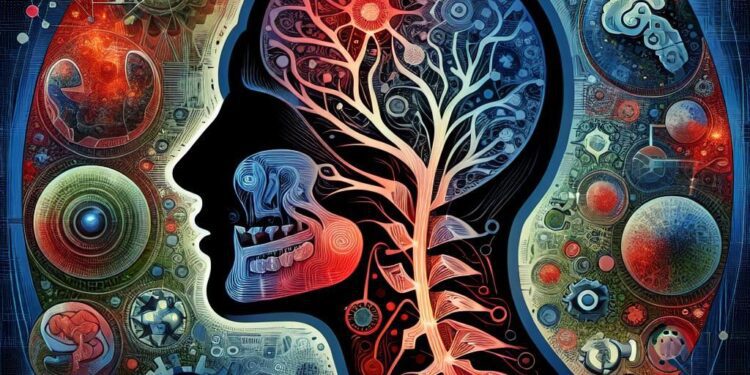Can Chronic Pain Cause Jaw Pain?
Imagine waking up each day to a relentless, throbbing ache that infiltrates your daily life, overshadowing even the simplest pleasures. Chronic pain is an uninvited guest in the lives of millions, often manifesting in various forms and locations within the body. Yet, there lies a lesser-discussed connection between chronic pain and an area that plays an integral role in your ability to communicate, express emotion, and savor food: your jaw.
As you sit at the dinner table, conversing with loved ones or indulging in a favorite meal, the last thing you want to be preoccupied with is discomfort or a gnawing pain in your jaw. This seemingly inconspicuous joint, known scientifically as the temporomandibular joint (TMJ), is responsible for the seamless movement of your jaw necessary to chew, speak, and yawn. It’s a versatile but intricate system that, when strained or overworked, can become a focal point of ceaseless pain and frustration.
But the question looms: Can chronic pain conditions ripple outward, extending their reach to your jaw? Delving into this intricate interplay between chronic pain and jaw pain uncovers an intricate tapestry of medical insights, weaving together threads from neurology, anatomy, and psychology. This exploration is not merely academic; it reverberates with profound implications for anyone grappling with persistent discomfort. Understanding the nuances behind this connection could be pivotal in seeking effective relief and reclaiming quality of life.
In this article, we will embark on a journey to unravel the mysteries behind the potential linkage between chronic pain and jaw pain. We will examine the physiological mechanisms at play, delve into common chronic pain conditions that may exacerbate jaw pain, and offer comprehensive solutions to manage and mitigate this debilitating duo. By the end, you will be equipped with a broader perspective and practical knowledge to navigate the complexities of living with chronic pain and its possible impact on your jaw.
Welcome to an exploration that could transform your approach to managing the intricate web of pain and bring you one step closer to holistic well-being.
Detailed Answer
Jaw pain can indeed be linked to chronic pain conditions, most notably through disorders such as Temporomandibular Joint Disorder (TMJD). TMJD can be aggravated or even triggered by chronic pain in other areas of the body, primarily because chronic pain can lead to muscle tension and stress, which in turn affects the jaw. For instance, fibromyalgia, a chronic condition characterized by widespread musculoskeletal pain, frequently includes symptoms of jaw pain due to the constant muscle tension.
Chronic pain management typically involves a multifaceted approach:
- Stress Management: Practices like mindfulness, meditation, and yoga can significantly reduce muscle tension.
- Medical Interventions: This may include prescription medications such as muscle relaxants, anti-inflammatories, or pain relievers.
- Physical Therapies: Regular visits to a physical therapist or chiropractor can help with muscle alignment and tension.
- Jaw Exercises: Gentle stretching and exercises specifically designed for TMJD can improve flexibility and reduce pain.
- Mouthguards: Using a mouthguard during sleep can prevent teeth grinding and clenching, which are common causes of jaw pain associated with chronic pain.
Here’s a quick overview comparing common treatments for chronic jaw pain:
| Treatment | Effectiveness |
|---|---|
| Stress Management | High |
| Medical Interventions | Varies |
| Physical Therapies | Moderate to High |
| Jaw Exercises | Moderate |
| Mouthguards | Moderate |
Adopting a combination of these therapies often yields the best results, as each approach addresses different facets of the underlying issues contributing to jaw pain.
Practical Advice
Experiencing jaw pain can significantly impact your daily life, from chewing to speaking. When this pain correlates with chronic pain conditions such as fibromyalgia or temporomandibular joint dysfunction (TMJ), understanding the connection and treatment options becomes crucial.
Chronic pain can indeed lead to jaw pain through various mechanisms:
- Muscle Tension: Chronic pain often causes muscle tension and spasms, particularly in the neck and shoulders, which can transfer pain to the jaw area.
- Stress and Anxiety: Psychological stress linked with chronic pain can lead to teeth grinding or clenching (bruxism), subsequently causing jaw pain.
- Nerve Issues: Conditions like neuropathy can affect the facial nerves, leading to jaw discomfort.
Below is a table summarizing potential treatments and their effectiveness:
| Treatment | Effectiveness | Considerations |
|---|---|---|
| Physical Therapy | High | Requires regular sessions |
| Mouth Guards | Moderate | Custom-fitted by a dentist |
| Stress Reduction Techniques | Variable | Yoga, meditation, and mindfulness |
| Medications | Variable | Anti-inflammatories and muscle relaxants |
Understanding the root cause of your jaw pain in the context of chronic pain can lead to more targeted and effective treatments. Consultation with healthcare providers, including dentists, physiotherapists, and psychologists, can provide comprehensive care tailored to your specific needs.
Scientific Insights and Research
Chronic pain and jaw pain are two conditions that can indeed intersect, creating a complex web of discomfort for affected individuals. Chronic pain, defined as persistent pain lasting over three months, can manifest in various parts of the body, including the jaw. This specific type of jaw pain, often referred to as temporomandibular joint (TMJ) disorder, can be exacerbated by chronic pain conditions such as fibromyalgia, rheumatoid arthritis, and more. These chronic conditions frequently lead to muscle tension, inflammation, and nerve damage, which can contribute to jaw discomfort and dysfunction.
Several approaches can help manage chronic pain and alleviate jaw pain symptoms:
- Medical Interventions: Anti-inflammatory medications, muscle relaxants, and pain relievers prescribed by healthcare professionals can provide significant relief.
- Physical Therapies: Techniques such as physical therapy, chiropractic adjustments, and acupuncture can help reduce muscle tension and improve jaw function.
- Lifestyle Modifications: Regular exercise, a balanced diet rich in anti-inflammatory foods, and stress management techniques such as yoga and meditation are beneficial in managing chronic pain.
| Treatment | Effectiveness |
|---|---|
| Anti-inflammatory Medications | High for reducing inflammation |
| Physical Therapy | Effective for muscle tension relief |
| Chiropractic Care | Beneficial for joint alignment |
| Acupuncture | Moderate to high for pain relief |
| Stress Management | Crucial for overall well-being |
Sources List
<p>The following key sources were instrumental in compiling the information on the relationship between chronic pain and jaw pain:</p>
<ul>
<li><strong>American Dental Association (ADA):</strong> Provided insights into how oral health can be affected by general health conditions, including chronic pain and its effects on the jaw.</li>
<li><strong>National Institute of Neurological Disorders and Stroke (NINDS):</strong> Offered extensive research on different types of chronic pain and their potential to manifest in various body parts, including the jaw.</li>
<li><strong>Journal of Orofacial Pain:</strong> Published numerous peer-reviewed articles exploring the connections between chronic pain conditions, such as fibromyalgia, and temporomandibular joint disorders (TMD).</li>
<li><strong>Mayo Clinic:</strong> Provided comprehensive guides on symptoms, causes, and treatments for jaw pain, particularly related to chronic conditions like arthritis and stress-induced pain.</li>
<li><strong>WebMD:</strong> Featured detailed articles on how chronic pain can influence various aspects of health, including jaw pain and associated symptoms.</li>
</ul>
<p>Below is a summary of the sources and their contributions:</p>
<table class="wp-block-table is-style-stripes">
<tbody>
<tr>
<th>Source</th>
<th>Contributions</th>
</tr>
<tr>
<td>American Dental Association (ADA)</td>
<td>Oral health impact due to chronic conditions</td>
</tr>
<tr>
<td>National Institute of Neurological Disorders and Stroke (NINDS)</td>
<td>Chronic pain manifestations in the jaw</td>
</tr>
<tr>
<td>Journal of Orofacial Pain</td>
<td>Research on TMD and chronic pain</td>
</tr>
<tr>
<td>Mayo Clinic</td>
<td>Guides on symptoms and treatments</td>
</tr>
<tr>
<td>WebMD</td>
<td>Health articles on chronic and jaw pain</td>
</tr>
</tbody>
</table>
Final Thoughts
### Outro: Untangling the Knot – Chronic Pain and Jaw Discomfort
As we draw the curtain on our exploration into the intricate relationship between chronic pain and jaw discomfort, it’s clear that this multifaceted issue is one that taps into a deeper understanding of our body’s interconnectedness. Chronic pain, with its pervasive and often misunderstood nature, has the potential to manifest in areas far removed from its origin, and the jaw is no exception. By unraveling the complexities behind this phenomenon, we’ve navigated through a landscape that includes the nuances of Temporomandibular Joint Disorders (TMJD), the ripple effects of anxiety and stress, and the role of systemic conditions that exacerbate discomfort.
Importantly, recognizing the signs and symptoms of jaw pain can be a crucial step in addressing the overarching issue of chronic pain. Our journey has highlighted how various factors—from sleep disturbances to psychological strains— can contribute to this specific form of discomfort. Therefore, cultivating a comprehensive approach that considers both physical and mental health is vital.
As we part ways, remember that managing chronic pain, including jaw pain, is not just about seeking medical interventions but also about embracing a holistic lifestyle. This involves maintaining a balanced diet, practicing good posture, engaging in regular physical activity, and finding ways to alleviate stress. Empowering oneself with knowledge and proactive health strategies can make a significant difference in the quality of life and overall well-being.
In the grand tapestry of our health, every thread counts. The jaw, with its critical functions in communication, nutrition, and expression, deserves our attention and care. If you or someone you know is grappling with chronic pain that extends to the jaw, take heart in knowing that there are pathways to relief and management. It’s a journey that may require patience and persistence, but one well worth undertaking.
With this, we close our chapter on the intersection of chronic pain and jaw discomfort—unveiling yet another layer of understanding in the vast and wondrous field of human health. Remember, a well-informed mind is the first step towards a healthier body. Thank you for joining us in this enlightening exploration, and here’s to your journey of health and resilience.












